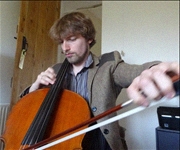Tutor HuntResources Music Theory Resources
Grade 5 Music Theory: Do You See A Hurdle Or A Door?
Why studying music theory is anything but dry and may just be the most useful experience of a learner`s musical education.
Date : 22/02/2017
Author Information

Uploaded by : William
Uploaded on : 22/02/2017
Subject : Music Theory
Budding classical musicians often benefit immensely from the goal-setting, time-pressure and gratification of taking yearly exams in their instruments. The most popular of these exams are administered by the Associated Board of the Royal Schools of Music (ABRSM). Despite the UK`s supposed culture of over-testing in education, my experience is that very few youngsters decline the opportunity, and most thrive on the progressive challenges of graded exams.
Until grade 6.
As teachers and students are often painfully aware, to be eligible to progress beyond grade 5 with ones instrumental performance, ABRSM requires students to take a two-hour written examination: grade 5 music theory. This is viewed by students, more often than not, as an inconvenient barrier to musical progress. Some switch exam boards to avoid it some attempt the exam multiple times before scraping the pass-mark without very few take the opportunity to deepen their understanding of music theory with a little extra reading or supplementary lessons.
All this is a terrible shame, I think, when there is as much pleasure to be had from learning about music theory. When people discover I`m a musician, they ask me what I play, but in truth it`s not the playing that I really love, it`s the theory. Many people, perhaps `you the reader` included, just don`t see how theory is going to be enjoyable or benefit them as musicians, so here are a few reasons that I hope will persuade you of its worth...
Be a more versatile musician
One of the most enjoyable experiences of my musical career has been working with pop musicians in an entirely different context than one trains for in ABRSM practical exams. Working with a band doesn`t involve reading pages of music notation it involves listening to and understanding chord sequences, scales and structures, and knowing how to improvise music that will work. Music theory has also opened up the world of directing, composing and arranging music for me in a way that would simply not be possible if I hadn`t studied harmony `on paper` first.
Enjoy music more!
There are as many different ways to listen to a piece of music as there are listeners. In fact, that`s not quite true there are many more ways than there are listeners. That`s because, a skilled listener - one who can switch his/her brain between melody, harmony, form, genre, and any number of other angles at will - can listen in so many different ways. The more `angles` one has in ones listening arsenal, the more intellectual satisfaction one can derive from listening.
Theory makes a huge difference at GCSE/A-Level
As a school teacher as well as private tutor, I can attest to the usefulness of up-to-scratch music knowledge on these courses. With a grade 5 level of performance and music theory, a GCSE student has about half the course covered before she/he starts, and a far-better-than-average chance of a top grade. If a student is thinking of taking their musical study to degree level, higher theory grades are amongst my primary recommendations - not only do higher grades (6+) count for UCAS points, but some university academics have even told me that grade 8 theory is a preferable qualification to A-level music when considering applicants.
Enjoy music theory for what it is
This is probably the most fundamental reason one should give music theory a chance. When approached openly and studied with real interest, it is actually an immensely satisfying pursuit. Addictive, even. Those students who begrudgingly `scrape the pass mark` at grade 5 are very hard to win over, as an A-level teacher, when trying to inspire to compose or analyse. Those who take the exam seriously - as an opportunity to learn rather than as an obstacle to be overcome - usually end up as excited as I am about completing a harmony exercise or writing their own piano miniature. They can hear the patterns in the music around them and can express something of themselves by manipulating those patterns in their own work. They are musical thinkers, as well as musical doers.
This resource was uploaded by: William
